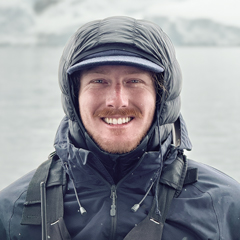
Kristian Gillies
I will forever be inspired by the natural world and feel incredibly fortunate to be able to guide and share these unique places, encounters, and experiences with others.
Expedition Leader Kristian Gillies
Kristian Gillies is a nature guide, wildlife ecologist and photographer based on Vancouver Island, British Colombia.
Growing up on the beautiful South Coast of New South Wales in Australia, Kristian was immersed in the ocean and surrounding seascapes from a young age, quickly developing a passion for surfing. Spending every spare minute in the ocean, Kristian quickly found an interest in its inhabitants, leading him to study Conservation Biology at the University of Wollongong. After graduating in July 2016, Kristian moved to California where he undertook an internship studying Blue Whales. This internship was where he developed an interest in marine mammal biology, and before he knew it, he was living on Vancouver Island, working as a marine biologist, and spending his days on the water photographing Killer Whales. After two successful seasons studying Killer Whales, Kristian made the move to wildlife ecology, with a growing interest in ornithology.
With a desire to combine his two fields of interest, Kristian now works as an expedition leader and field naturalist, traveling to remote destinations and sharing his passion for its inhabitants as he goes.
Kris brings a wealth of experience, and his passion for wildlife and the natural world is evident in his enthusiastic and informative guiding. He provided fascinating insights into animal behavior and habitats. This enriched our understanding of the unique ecosystem and made our encounters with wildlife even more meaningful. Kris is also a highly talented photographer.
-Chris I., New York
Kristian's Expeditions
Taiwan, Philippines & Indonesia (June 9 – 27, 2025) 
Crossing both the Tropic of Cancer and the Equator, weave your way through some of the most biodiverse regions on the planet for incredible wildlife and ancient cultures.
Japan's National Parks (May 31 – June 15, 2026) 
Experience iconic cities, ancient customs, renowned arts, remote coastlines, and spectacular wildlife on this circumnavigation of Japan’s main island of Honshu.
Ask Kristian a question about his upcoming expeditions?
Get in TouchMysteries of our Planet’s Largest Animal
I find it absolutely fascinating that we still don’t know the breeding grounds of our planet’s largest animal—the Blue Whale. After being heavily targeted during the whaling era, these gentle giants have not rebounded with the speed of other baleen species, and unlocking critical insights into their breeding and calving grounds is essential to ensure they are able to make a return to pre-whaling numbers. These whales are ecosystem engineers, fertilizing the phytoplankton with their iron-rich poop, and in turn, increasing food for their own prey—krill.



